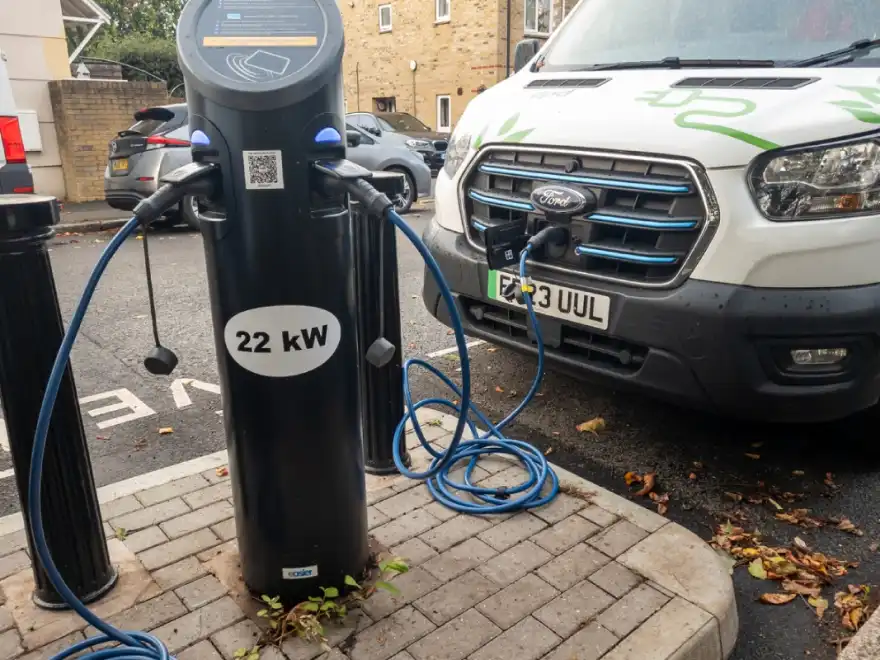
The Workplace Charging Scheme (WCS) encourages businesses and employees to switch to electric vehicles (EVs). Run by the Office for Zero Emission Vehicles (OZEV), it provides financial support for installing EV chargepoints at workplaces. The scheme ends on 31st March 2025, so time is limited.
This guide explains how it works and the benefits it brings.
What is the Workplace Charging Scheme?
The WCS is a voucher-based scheme that increases EV charging points at workplaces. It is open to:
- Businesses
- Charities
- Public sector or public authority organisations
Eligibility requirements include:
- Being located in England, Scotland, Wales, or Northern Ireland (Channel Islands and Isle of Man excluded)
- Receiving less than £315,000 in public support in the past three financial years
- Meeting certain state aid rules
Chargepoints must be installed in dedicated off-street parking or parking linked to the premises, used by staff, not customers. Some organisations (like public authorities, charities, or small accommodation businesses) can open their chargers to the public, while other businesses may only allow local residents to use them outside office hours.
Landlord consent is required if the property isn’t owned by the applicant. Hotels, holiday lets, campsites, and even the self-employed working primarily from home can apply.
The grant covers up to 75% of chargepoint costs, capped at £350 per socket and 40 sockets total (including up to 20 pairs of double sockets). Typical commercial EV chargers cost up to £1,500 + VAT per unit.
Example:
- 10 fleet cars without WCS cost £15,000 + VAT
- 10 fleet cars with WCS cost £11,500 + VAT
- 50 chargepoints without WCS cost £75,000 + VAT
- 50 chargepoints with WCS cost £57,500 + VAT
Benefits for Businesses
The WCS saves money and delivers other advantages:
- Lower fuel costs: Electricity is cheaper than petrol or diesel. For a fleet of 10 cars driving 13,200 miles per year, businesses save around £13,200 annually. For 50 cars, savings reach £66,000 per year.
- Greener image: Switching to EVs shows the business is sustainable ahead of mandatory changes.
- Employee perks: Workplace charging boosts morale, recruitment, and retention.
- Customer appeal: Hotels or restaurants with EV chargers attract affluent EV-driving customers.
Benefits for Employees
- Reduced range anxiety: Charging at work makes EV ownership easier, especially for staff without driveways.
- Lower running costs: Even paid charging costs less than petrol or diesel.
- Tax savings: EV company cars attract lower Benefit-in-Kind (BiK) rates.
Examples for 2024:
- Volkswagen Golf petrol: BiK 30% → £140/month for a 20% taxpayer
- VW ID.3 electric: BiK 2% → £12/month
- BMW 320i petrol: BiK 34% → £2,256/year
- Tesla Model 3 electric: BiK 2% → £174/year
From 2025, EV company car tax rises but remains cheaper than petrol or diesel equivalents.
How to Apply
Applicants complete the online WCS application and check eligibility. If approved, they receive a voucher code by email within five days and redeem it with a WCS-approved installer within 180 days.
Installer responsibilities include:
- Claiming the grant on behalf of the applicant
- Recording chargepoint make, model, and installation costs
- Submitting installation photos and serial numbers
- Ensuring OZEV approval and meeting technical requirements
Complaints go directly to OZEV by email.
Conclusion
The Workplace Charging Scheme provides businesses and employees with the chance to save money, cut emissions, and adopt greener transport. With incentives like the Plug-in Car Grant ending, now is the time to act.




